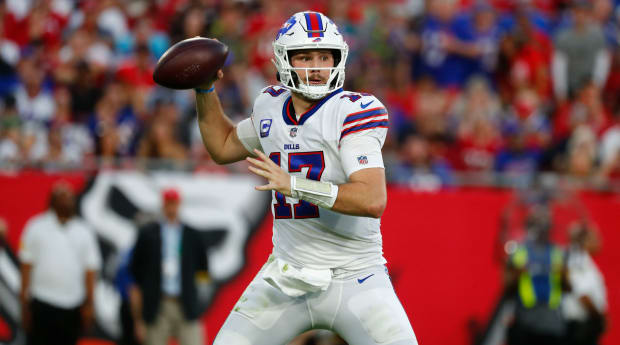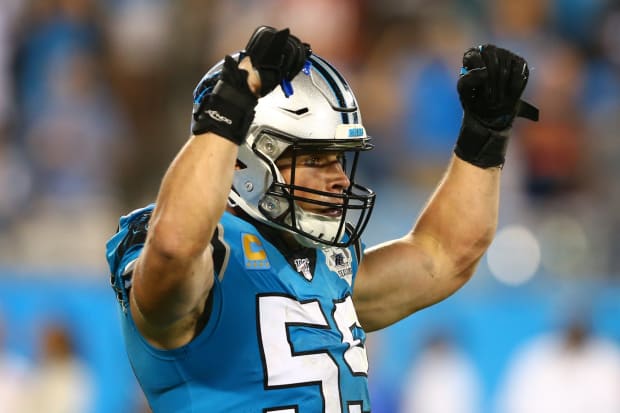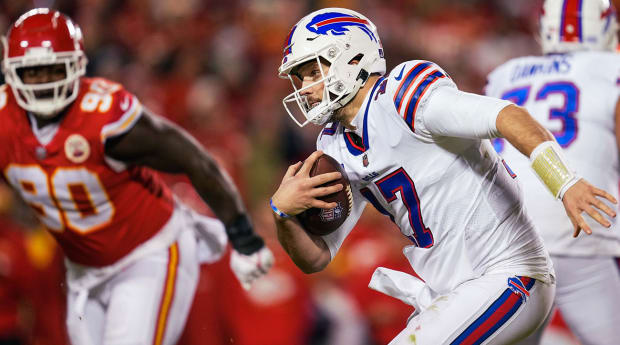Down three touchdowns to the greatest player of all time, he orchestrated a comeback that fell just short. But it was a turning point in the quarterback’s career.
The Bills had been shut down by the Patriots on a windswept Monday night and, six days later, their season was officially on life support. At 7–5, a loss in Tampa against the defending Super Bowl champion Buccaneers and Tom Brady would mean falling two games behind their old nemeses from Foxboro and make the rest of December and January a steep uphill climb.
Then, they fell three touchdowns behind the Buccaneers, and their walk to the locker room for halftime might as well have been across a metaphorical Green Mile.
But the Bills would soon figure something out—Josh Allen wasn’t going out like that.

Kim Klement/USA TODAY Sports
In the locker room, the fourth-year quarterback was direct. He was forceful. He came across naturally, and authentically, and brought to life something that his teammates hadn’t seen from him. The guy who would pack Coors Lights for the golf course with them, who could take a prank and dish one out, could also flip a switch and do what so many in the organization had wanted from him over the previous months and years.
“He’s such a competitor; I think it was a combination of his competitive nature coming out in that form, at that moment, and also just him continuing to mature and say, O.K., no, this is my moment, and I’m gonna do something about it,” said coach Sean McDermott, leaning against a fence at training camp early one night in July. “I don’t want to go into detail; it’s just guys listened to him. And you gotta have that.”
“We were getting our ass whooped,” veteran safety and captain Micah Hyde added. “And it was one of those things where it was like, Look, man, we’re not just gonna come out here and get embarrassed.”
On the Bills’ second possession of the second half, Allen ensured that, win or lose, that wouldn’t happen. He drove the Bills 81 yards in nine plays. He converted fourth-and-1 on a quarterback sweep that he cut back into the teeth of the defense. He scored three plays later on third-and-2, running a zone-read keeper up the middle for an 18-yard touchdown.
And on that last one, he hurled the ball as hard as he could into the back wall of the field area at Raymond James Stadium, as if to announce to everyone what was coming.
“That’s the projected growth that they had for me when they drafted me,” Allen said. “Not being as polished, trying to learn and grow in the game of football and as a quarterback. The first thing I tried to do is just show guys on the team how much I cared by playing as hard as I did and going the extra mile and jumping over people and putting my shoulder down. I wanted to show how much I love the game, how much I want to win.
“And then just like you said, it’s the natural progression of becoming a more vocal leader and taking ownership of the offense and the team and just trying to set us on a good trajectory and ultimately trying to be the example for what we’re trying to do here.”
The Bills wound up losing the game 33–27 in overtime after a furious comeback. But it’s pretty easy to argue now they gained more than they lost that night—in the step Allen took as the face of the franchise. Buffalo didn’t lose again until a historic divisional round shootout in Kansas City, choking out those Patriots twice along the way for good measure.
And now, going into 2022 under an avalanche of expectations, the Bills move forward with a quarterback they know is ready for the moment.

Jeremy Brevard/USA TODAY Sports
McDermott tells this story of rookie linebacker Luke Kuechly from 2012 and how it relates to Allen’s development as a leader.
The Panthers had taken Kuechly ninth overall, and he was carrying himself like anything but a high first-round pick. The linebackers would lunch together and, day after day, Kuechly would walk over to the water cooler or to throw something out, and ask Thomas Davis or James Anderson or Jon Beason, You need anything? And if anyone else had done it, maybe it would’ve seemed contrived by a kid trying hard. In this case, though, it was convincing.
That was Kuechly.
There was the flip side to that, too. For the longest time, the Panthers couldn’t quite get Kuechly to stand in front of the room. Didn’t matter if it was McDermott (then the defensive coordinator) or Ron Rivera, or a veteran teammate such as Davis or Charles Johnson asking, the young linebacker wasn’t going to force himself on anyone.
“The guy is young; everybody sees how great he is, but Luke didn’t want to step on guys’ toes, whether it was Thomas Davis, Charles Johnson, any of those guys,” said Bills GM Brandon Beane, who was Carolina’s director of football operations at the time. “He would just always kind of do everything right.”
To Kuechly, it was about deferring to the guys in the locker room (Steve Smith Sr., Jordan Gross, Ryan Kalil, Greg Olsen, Johnson, Davis, etc.) who had pelts on the wall, until he had some of his own. And as he saw it, because those guys were there, the team didn’t need him to be that guy yet, anyway. He could afford for it to come to him naturally.
“When I first got there, for me, it was like … No one wants to hear anything from me; I just need to show everybody I can play football,” Kuechly explained. “That’s how I always felt; it was like, I want to be good at football, because if I’m good at football, everything else will kind of take care of itself. Those guys were great leaders. We had guys on offense, defense, we were so set there. And I always felt like guys that wanted to beat their chest and say, I’m the leader, I didn’t know how I felt about those guys, anyway.
“So I think the best way to be a leader is to do it in the most natural way that comes to you. And I think when I was a young guy, I need to show up, I need to work hard, I need to be good at what my job is, and then if I have something down the road, and I’ve checked a few boxes where I’ve earned people’s respect, maybe I’ll say something. It’s more powerful when you don’t say things all the time, and when you do, it’s something you genuinely mean.”
Again, it’s who Kuechly was. It’s also, in a lot of ways, who Allen is.
“It’s a great analogy in this case,” McDermott said, “because Luke waited, too.”
The Buccaneers game was Allen’s 56th start as a pro. He’d already been to the playoffs twice. He made the AFC title game the January before. He’d gotten a big second contract. The leaders the Bills had leaned on through the years—be it Kyle Williams and Lorenzo Alexander early on, or Hyde and Jordan Poyer more recently—knew exactly who Allen was.
And then? Allen knew when it was time.
As such, the halftime scene in Tampa unfolded organically for Allen. He knew what the team needed from him, and he was going to give it to them.
“It’s carrying more weight in those moments when s---’s not going well,” he said. “You can say as much as you want when things are going great, and everyone’s going to love it. When stuff doesn’t go the way you think it’s going to, the way it’s supposed to be going, it’s saying that’s the case, and then going out there and doing something about it.”
Which Allen did.
Doing something after halftime against the Buccaneers was a pretty big deal, too. And Allen’s words were followed by a second-half performance to remember—after the break, he was 24-of-34 for 178 yards and two touchdowns. He rushed for another 66 yards and the aforementioned touchdown on eight carries. The Bills outscored the Bucs 24–3 over the last 30 minutes of regulation and ran off a 17–0 fourth quarter to force overtime.
But it wasn’t just that Allen brought them back. It was how he brought them back, making throws with the Buccaneers’ pass rush chopping him down, and running through their front when the Bills needed him to. Allen’s teammates are fond of saying, because of his normal-guy demeanor, he kind of comes off like a tight end. On that Sunday, he was playing with the edge of one.
“Because of the position he plays, and who he is, and what he’s capable of, when people see someone go to that level, to have that level of intensity, passion, it’s infectious. It becomes contagious, and it can really motivate people,” McDermott said. “That’s what leading by example looks like.”
It was like Allen called his shot at the half of that game, and delivered in the most emphatic way.
And it wouldn’t be the last time he did it.
Watch the Bills live with fuboTV: Start a free trial today!
Hyde remembers before a home game soon thereafter—he couldn’t quite recall which one—everyone saw it happen again, this time not at the half, but in pregame.
“It wasn’t a long speech, it wasn’t anything crazy, he just said we’re going to go out there, and I am going to do this,” he said. “And we were like, Oh, O.K. And dude just went out there and went off. So when he’s going, and he’s talking about, Offense, we’re gonna go out there and we’re gonna score, and he’s being demanding, he’s being Josh, the whole team feels it. The whole team feels it, even the coaches. It’s a sense of urgency.”
That sense of urgency has been everywhere in Buffalo, and Allen’s helped fuel it, now that it’s his turn to lead, and it might be for some time.

Jay Biggerstaff/USA TODAY Sports
The key to all of this is what’s coming from Allen is real.
“It doesn’t surprise me that the narrative there is that Josh approaches the leadership from a position of authenticity,” his throwing coach, Jordan Palmer, says, “because it’s how he’s approached every other phase of his life, with authenticity.”
And Allen and I talked at training camp. There was nothing more authentic than his own reaction when I brought up the other blistering shootout the Bills lost this year, in January at Arrowhead.
“Which one’s that one?” he said, with a sly smile, before answering the question.
“Well, at the end of the day, we lost the game,” he continued. “And whether we lost by, I think it was six, or by one, or by 50, we didn’t get the job done. So we’re just trying to use that, and understand that can fuel us going forward, and we got to find a way. And we didn’t that night. But we’ll learn from it and we’ll grow. It’s water under the bridge now, and there's nothing we can do about it but move forward.”
Moving forward was where Allen built upon moments such as the ones in the locker room down the stretch of last year.
If anything, he says, the loss to Kansas City showed him how fleeting the opportunities to pursue a title can be, even for a quarterback who’s only 26, or for a team that seems as set up to be as good for as long as the Bills. Which has added perspective to the opportunity in front of the Bills now, and motivation to harness Allen’s influence in the building first, in setting the right example, and second, in being more vocal when the situation calls for it.
“He’s more content and calm—but driven,” Beane said. “The only day he missed practice through the offseason was when he flew out for The Match. You want to send a message to your team, how important it is to be there and do things? He flew back through the night and was at the practice the next morning. Who does that for voluntary workouts? He doesn’t want to miss anything. He doesn’t want to miss lifting a weight.”
His teammates follow him, too, because most of the time they still get the kid from rural California, and not some cookie-cutter franchise quarterback. That might come in trash talk during 11-on-11 work. It might come on the golf course. It might be in the lunchroom.
For me, it was when he came over to our set without shoes on. I thought to ask him about that, but just figured it was some sports-science thing guys do after practice—maybe he was letting his feet breathe or something.
I wished I’d double-checked on that. It turns out, he’d met two kids who’d come in from Buffalo for practice. They were upset when they approached him because they didn’t have anything for him to sign. So, spur of the moment, Allen took his cleats off, signed one and gave it to one of the kids, then signed the second one to give to the other kid.
It was an example, again, of Allen having a sense for the moment, and doing the right thing.
To him, that’s really what halftime in Tampa was about, too.
“Obviously, it took all of us as a team to understand it, but I did feel, at that halftime, our season only had a few more games left, could go one way or the other,” he said. So I was just doing everything in my power, playing as hard as possible, being as communicative as possible, and just kind of leaning into that and using that as we kind of went to get to the playoffs. I guess that, in my opinion, that would’ve been a turning point for us last year.”
Everyone in the building seems to believe it was a turning point for him, too.
More NFL Coverage: